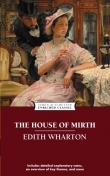BKMT READING GUIDES
The House of Mirth (Enriched Classics (Simon & Schuster))
by Edith Wharton
Mass Market Paperback : 480 pages
2 clubs reading this now
0 members have read this book
An incisive portrait of New York high society and the somber economics of marriage during the late nineteenth century, Edith Wharton's The House of Mirth tells the story of beguiling socialite Lily Bart's ill-fated attempt to find ...
Introduction
ENDURING LITERATURE ILLUMINATED BY PRACTICAL SCHOLARSHIP
An incisive portrait of New York high society and the somber economics of marriage during the late nineteenth century, Edith Wharton's The House of Mirth tells the story of beguiling socialite Lily Bart's ill-fated attempt to find happiness.
THIS ENRICHED CLASSIC EDITION INCLUDES:
? A concise introduction that gives the reader important background information
? A chronology of the author's life and work
? A timeline of significant events that provides the book's historical context
? An outline of key themes and plot points to guide the reader's own interpretations
? Detailed explanatory notes
? Critical analysis and modern perspectives on the work
? Discussion questions to promote lively classroom and book group interaction
? A list of recommended related books and films to broaden the reader's experience
Simon & Schuster Enriched Classics offer readers affordable editions of great works of literature enhanced by helpful notes and insightful commentary. The scholarship provided in Enriched Classics enables readers to appreciate, understand, and enjoy the world's finest books to their full potential.
"The heart of the wise is in the house of mourning; but the heart of fools is in the house of mirth," warns Ecclesiastes 7:4, and so does the novel by Edith Wharton that takes its title from this call to heed. New York at the turn of the century was a time of opulence and frivolity for those who could afford it. But for those who couldn't and yet wanted desperately to keep up with the whirlwind, like Wharton's charming Lily Bart, it was something else altogether: a gilded cage rather than the Gilded Age.
One of Wharton's earliest descriptions of her heroine, in the library of her bachelor friend and sometime suitor Lawrence Selden, indicates that she appears "as though she were a captured dryad subdued to the conventions of the drawing room." Indeed, herein lies Lily's problem. She has, we're told, "been brought up to be ornamental," and yet her spirit is larger than what this ancillary role requires. By today's standards she would be nothing more than a mild rebel, but in the era into which Wharton drops her unmercifully, this tiny spark of character, combined with numerous assaults by vicious society women and bad luck, ultimately renders Lily persona non grata. Her own ambivalence about her position serves to open the door to disaster: several times she is on the verge of "good" marriage and squanders it at the last moment, unwilling to play by the rules of a society that produces, as she calls them, "poor, miserable, marriageable girls.
Lily's rather violent tumble down the social ladder provides a thumbnail sketch of the general injustices of the upper classes (which, incidentally, Wharton never quite manages to condemn entirely, clearly believing that such life is cruel but without alternative). From her start as a beautiful woman at the height of her powers to her sad finale as a recently fired milliner's assistant addicted to sleeping drugs, Lily Bart is heroic, not least for her final admission of her own role in her downfall. "Once--twice--you gave me the chance to escape from my life and I refused it: refused it because I was a coward," she tells Selden as the book draws to a close. All manner of hideous socialite beasts--some of whose treatment by Wharton, such as the token social-climbing Jew, Simon Rosedale, date the book unfortunately--wander through the novel while Lily plummets. As her tale winds down to nothing more than the remnants of social grace and cold hard cash, it's hard not to agree with Lily's own assessment of herself: "I have tried hard--but life is difficult, and I am a very useless person. I can hardly be said to have an independent existence. I was just a screw or a cog in the great machine I called life, and when I dropped out of it I found I was of no use anywhere else." Nevertheless, it's even harder not to believe that she deserved better, which is why The House of Mirth remains so timely and so vital in spite of its crushing end and its unflattering portrait of what life offers up. --Melanie Rehak
Discussion Questions
No discussion questions at this time.Book Club Recommendations
Recommended to book clubs by 0 of 0 members.
Book Club HQ to over 90,000+ book clubs and ready to welcome yours.
Get free weekly updates on top club picks, book giveaways, author events and more








